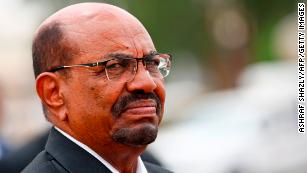For most people in Sudan, Omar al-Bashir is the only leader they have ever known, his 30-year rule defined by brutal oppression and astounding political survival.
Under Bashir, an entire generation grew up in the shadow of war, where the threat of torture in infamous “ghost houses” was never far away, and press freedom nonexistent.
Girls grew up looking over their shoulder for marauding gangs of “morality police,” ready to flog them simply for walking down the street with a male friend.
Boys in the north grew up in fear of being dragged from their homes to fight the civil war in the south.
Bashir taught everyone to live in fear. But he also taught them what they didn’t want, and even under his decades-long oppression they still, incredibly, visualized a democratic society.
On Thursday they came a step closer to achieving it, helping to topple the 75-year-old dictator who managed to cling to power despite being wanted by the International Criminal Court in connection with atrocities in Darfur.
After taking control in a coup in 1989, and becoming president in 1993, Bashir has proven himself the consummate political survivor. He conducted a campaign of ethnic cleansing in Darfur, yet simultaneously made himself indispensable to Gulf states and the West through military campaigns and cooperation on counter-terrorism.





